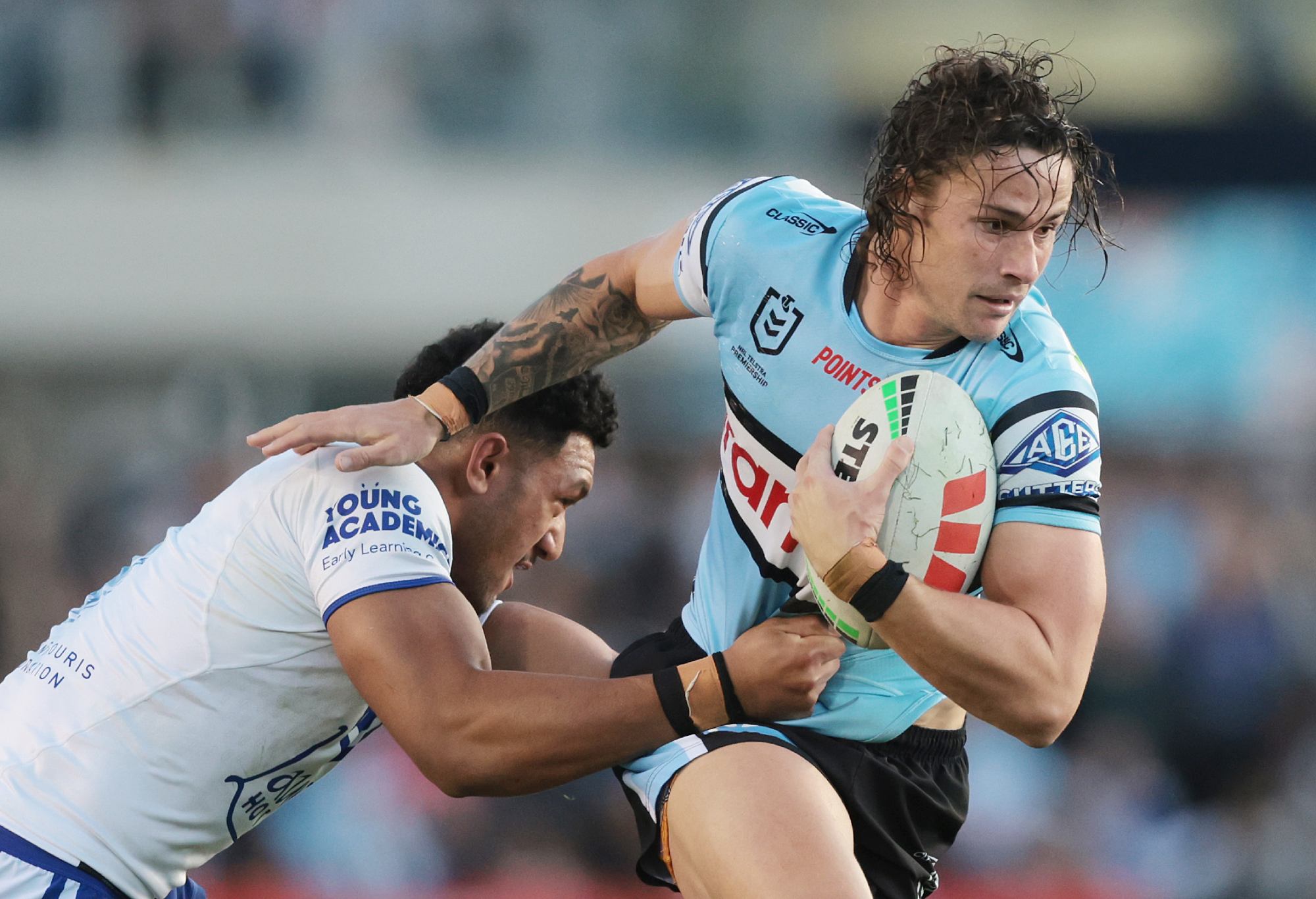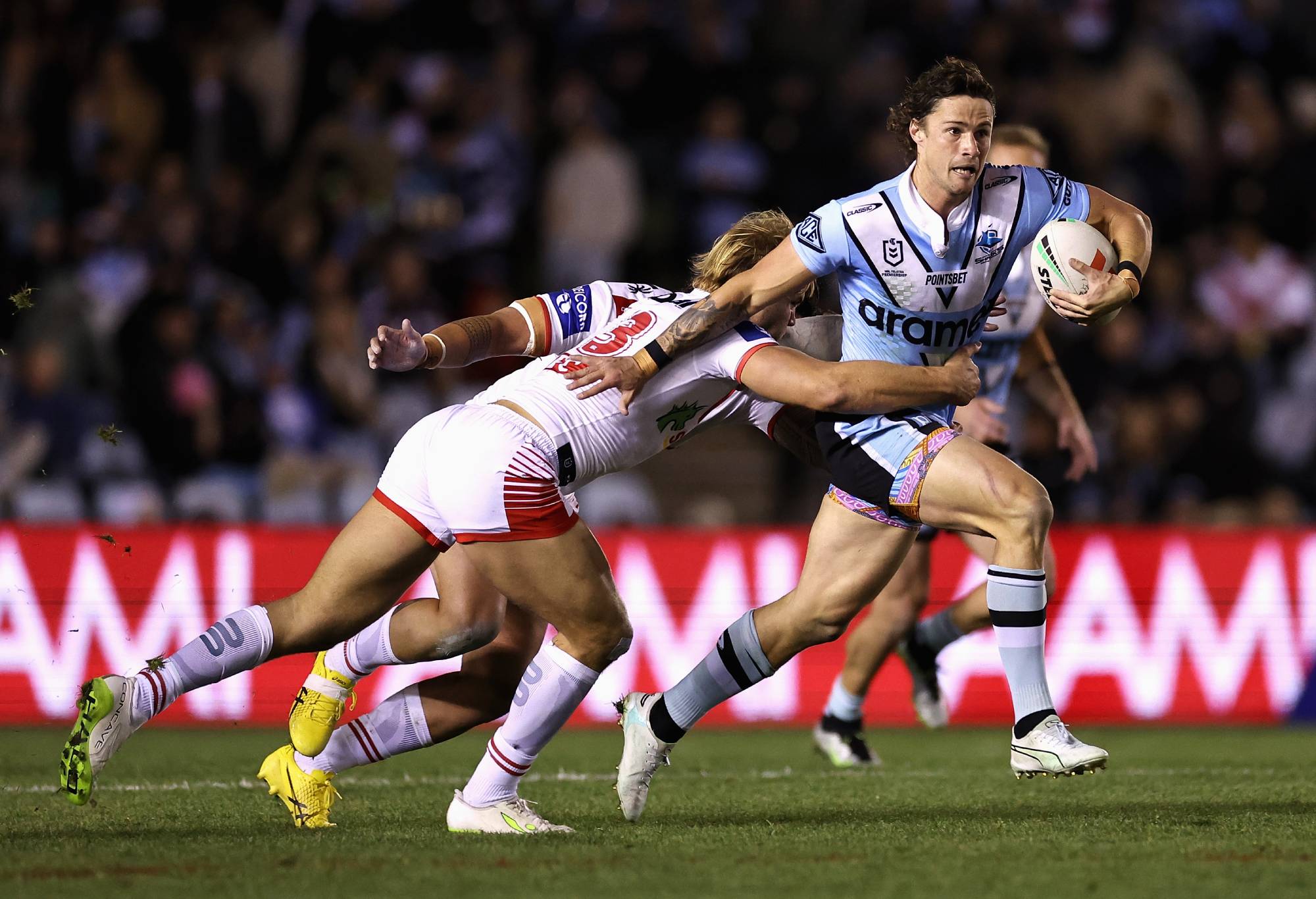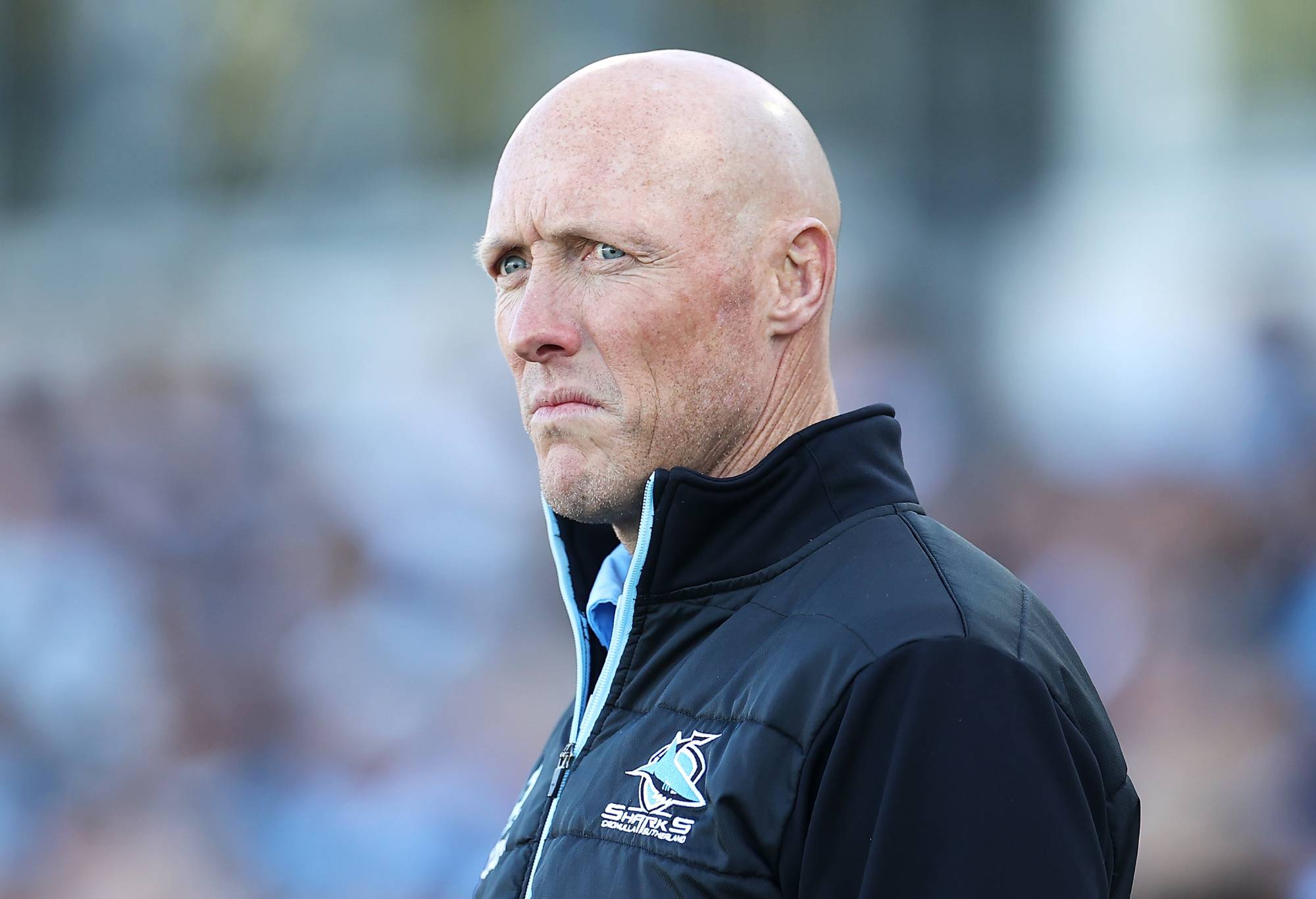'Look like a Chucky doll!' Cam McInnes does Matty Johns interview looking like this, hilarity ensues
"Apologise for my appearance as well, boys - I usually look better than this!"
There’s been a fair bit of chat this week about Nicho Hynes, Will Kennedy and why the Sharks have fallen off a cliff in recent weeks.
On the face of it, it’s quite simple. The Sharks can’t beat anyone good, but roll over anyone bad. Will Kennedy is now injured and Nicho Hynes seems to have lost form after being stunningly mistreated during the Origin period.
None of this is untrue: Hynes is below the admittedly astronomical standards he set himself, Kennedy is all but done for the year and, consequently, the Sharks are even less likely to make the Finals.
But why Cronulla have dropped off is a little more complex. They didn’t become bad overnight, and it’s not as if they turn up to good teams and just lose. It happens for a reason.
Understanding that reason could be the key to turning it around and becoming a better team, even if that isn’t this year.
Needless to say, it’s easy to point at the highest-paid player in one of the world’s most systematised sports and ask why they aren’t doing any better, but it doesn’t get you anywhere.
Hynes isn’t specifically the reason the Sharks are losing any more than he was specifically the reason they were winning.
Given some of the soap opera commentary around his performances, it’s worth mentioning that he doesn’t award Dally M points, nor does he choose how much he is paid. Other people do that.
Some players are well paid and do well in the Dally M because of their situation. Ben Hunt, for example, gets the double whammy of being both the best player in a bad team, therefore hoovering up points, and being in a team with a tactical plan that doesn’t extend much beyond “give it to Ben”.
That’s not Hynes. Indeed, Hynes might not even be the best player that the Sharks have. There’s a strong argument that their most influential figure is actually Will Kennedy, which is a massive blow given his current injury.
This isn’t to say that Nicho isn’t influential, because he clearly is, but it might be that the crucial differentiator between their best and worst is the man out of the back.
It all comes down to where the Sharks want to score, and the parts that have to move for them to get there.
They aim at the corners, with a highly systemised approach to producing points that is practiced to within an inch of its life.
They’re not unique in this, because most teams have a plan and the best have a specific, repeatable plan, but they might be uniquely dependent on theirs. There isn’t much of a Plan B.

Nicho Hynes. (Photo by Mark Metcalfe/Getty Images)
What they do is a form of ‘pinning’. Pinning is, in essence, attempting to manipulate the opposition line to create gaps where you would want them to be to suit your strike players.
You ‘pin’ your opponent to a certain area through your actions, which allows you to attack where they aren’t.
For Cronulla, that means men in movement off the ball that keep the opposition line condensed, creating space in the corners for Sione Katoa and Ronaldo Mulitalo to attack.
This works because the backrowers – notably Briton Nikora – are such a threat back on an angle that the defence has to stay narrow.
Cronulla’s gambit is that they can get from narrow to wide quicker than their opponents, with the winger invariably getting to the corner flag for the putdown before the cover tackler gets across.
This is where Kennedy and Hynes come in. Nicho picks the moment to go, Will finishes it off.
Hynes’ role within the Sharks attack is crucial, because he’s the principal play caller and is responsible for tracking the numbers.
He’s pretty much always the first receiver – taking the joint most touches in the comp with Jackson Hastings – but with a variety of different options to pass to, given the high number of men in motion that Cronulla try to throw at the opposition defence.
It’s his job to constantly make decisions around pass selection, or more accurately, around runner selection, electing either to hit the lead or to go out the back.
The back is where Kennedy is vital. It’s not him, per se, as much as the perception of him.
Kennedy is a near unique combination of big, fast, strong and skillful that he can get into position, pick the final ball and ice the moment while also popping up on both sides of the field and offering a threat himself.
‘Near unique’ is the right phrasing. Kennedy is the second best at this, with Latrell Mitchell the most similar player to him and, indeed, the only fullback actually better at it than the Sharks number one.
Kennedy and Mitchell are an apples-to-apples comparison, given the way that the Sharks and Souths go about attacking.
Souths pin through the men with the ball, with every ball-player digging into the line. Cam Murray, then Lachlan Ilias, then Cody Walker all go close enough to contact to pin the tacklers, but release to the next man to keep the move going.
Eventually, Latrell has himself on the end, with a short pass to the centre and a long pass to the winger, plus the run, as options. Invariably, it’s too much for defences.

(Photo by Cameron Spencer/Getty Images)
Mitchell and Kennedy exist as the finisher, the player tasked with the moment, but also as the big stick waiting if the defence take their eyes off the ball.
Hynes and, at Souths, Cody Walker, often get the assists one link further rin because the edge defenders are worrying about the fullback, leaving space inside for someone else to hit. That’s when Nikora comes on the crash line.
Kennedy is bottom among regular fullbacks for touches per game – though ironically, unlike Mitchell, you never heard of him being told to get involved more – but, like so much at Cronulla, it’s his off-ball work that is important.
The threat out of the back is sufficient that he doesn’t actually have to get the footy to have an effect. It’s all part of the deception, which is, in turn, a contributor to the pinning.
Souths and Cronulla excel on this going narrow to wide, but it needn’t be so: Parramatta have their wingers with their feet on the chalk to spread the play as much as possible from the start, in the hope that they can create one-on-one mismatches inside that their ball-playing forwards can exploit. There’s many ways to skin (or pin) a cat.
So where does it all go wrong? The answer, again, is found by looking at Souths. This year’s edition of the Bunnies are masters at the shift play, but without Mitchell, it often falls apart.
Without the big man at the back, the threat diminishes and the defence are more willing to go for the player in front of them, playing the runners and not the pass, confident that they won’t get burned outside. The defence can jam, or fly out of the line, or simply slide.
Most teams that don’t have a Kennedy or Mitchell don’t ever try to attack this way, because it wouldn’t work for this exact reason. Not everyone has the combination of skilled players inside or the ideal finishing touch player outside.
In Souths’ case, when Latrell is absent the defence can just focus on the ball carrier, tracking the inside shoulder and showing the Bunnies the sideline. If you think you can get around us, try your best.
With a lesser fullback, that plan often works and Souths drop the ball, end up in touch or simply get tackled and have to go again.
Brisbane, last week, put on a masterclass in this: their line bent, but barely broke. Souths racked up line breaks – on a statistical level at least – but the line was, one bad Kotoni Staggs miss aside – rarely actually penetrated.
The Sharks suffer that, but in a different way. Firstly, good teams will happily let them go sideways towards the wings, tasking the attack with being faster at the corner than they can slide. Again: if you think you can get around us, try your best.
But they’ll also back that Cronulla just aren’t quite good enough under pressure, pressuring up and in to drastically cut down the amount of time that Hynes has to make decisions.
When the line speed is good, the space is limited and more mistakes follow.
Cronulla make the most errors in the comp. That’s not necessarily a bad thing, because they make most of them while trying to do something with the ball, but it does show that they aren’t quite where they want to be in execution.

Sharks coach Craig Fitzgibbon. (Photo by Mark Kolbe/Getty Images)
The Sharks attack with depth, artificially increasing the gap between defence and offence, but it only goes so far.
Hynes either has to hit the lead runner, run himself or go out of the back, and without enough go forward, the first two options are safer.
It’s not a criticism of Nicho, by the way. He’s playing the decisions in front of him. But it is a function of a system that is currently suboptimal, which is perhaps understandable given how long Cronulla have been working at it compared to Souths, who still struggle with their version even at the best of times.
The lack of punch through the middle also limits the Sharks. By necessity of their off-ball system, they don’t have the big men who can punch holes and win the floor, which in turn enables the shift.
They lack a proper big man, a Tom Burgess, Tevita Tatola, Hame Sele type who makes high contact on the chest, knocks a tackle back then hits the deck.
Even other middling sides, such as Manly, have this and when they’re at their best, can use it to put on their plays to fast outside backs.
Against poor teams, it doesn’t matter because the line speed is never that good and Cronulla can work their magic. Allowed to put on their moves, few teams can stop them.
But, as Penrith showed on Saturday night, if a defence can get in Cronulla’s face, the mistakes will follow and the imagination disappears.
Good teams, those that pride themselves on line speed, do this all the time. Brisbane, too, have shown how to knock Cronulla off their stride. Now, even those who aren’t the best of the best have seen to see enough tape that they can do it too.
You’ll notice that we haven’t mentioned Cronulla’s defence at all. They’ve been slammed for that of late, but with the Sharks, it’s always been holistic. They lose the transitions, which creates pressure, which causes defensive issues.
Matt Moylan, now dropped, was a liability in the front line, but even since he’s been out of the side, it hasn’t improved. It might yet be that the systems are good – Cronulla don’t concede bulk metres and are average for line breaks conceded – but the constituent parts are letting them down through individual errors and cohesion problems.
Fitzgibbon talks constantly about wanting to have a defensive mindset, and he’s right to do so: the main improvement in Souths over time was in their defence, which took them to the top of the table before being slammed during Origin. The Sharks play similar footy, but are earlier in their learning cycle as a team.
The pair face off on Saturday night and the Bunnies start as huge favourites – and have already defeated Cronulla once this year. If the Sharks lose, they’ll be outsiders to make the finals unless a raft of other results go their way.
Without Kennedy at the back, you can pretty much put a line through the Sharks, because their attack is so dominant on his role as a threat, whether real or imagined. Connor Tracey, named in the 1 jumper this week, is perfectly adequate, but he’s no Kennedy.
This isn’t to write off Cronulla long term. Few sides are so cohesive in attack and have such a clear way that they think they can score.
Their next evolution might be to add a big man – and it might well already be there in Tom Hazleton, who can grow into that role.
It might be to bring in a smaller, more dynamic forward like Jake Trbojevic or Cam Murray who can hit the deck and play fast while also having the off-ball agility to do the rest of the work.
Like Souths in 2021 and 2022, it could be that they just need to tweak around the edges, to refine the style and fill the gaps.
Craig Fitzgibbon will know that a second place finish, like they achieved last year, was probably a bit of a mirage, and that if they miss the eight this year, it could also be a little bit out on their true levels.
If he can meet triumph and disaster and treat those two impostors just the same, he will likely see where the improvement can be found. It just might be that it isn’t in 2023.